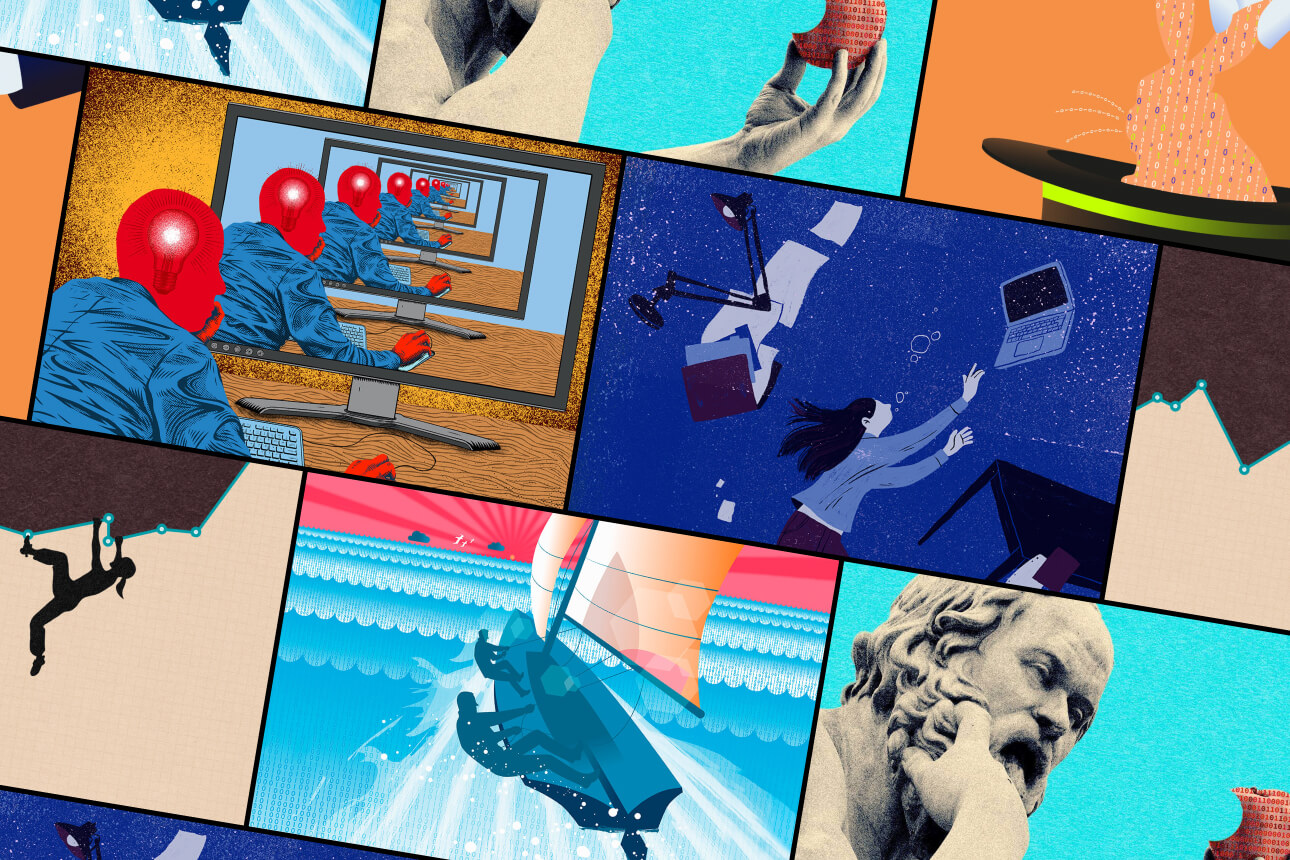
“Soft skills” are notoriously undervalued, but have never been more essential. These techniques can help you refine yours.
BY FAISAL HOQUE
These days, we hear a lot about the importance of STEM degrees and how automation will eliminate our jobs. There’s even talk of how companies are working toward “lights out” facilities where robots basically work around the clock, in the dark. But while it’s hard to dispute the value that robotics and automation bring to business, there’s also a something missing from this conversation. We’re losing sight of the importance of soft skills–like communication, empathy, mindfulness, creativity, collaboration, and leadership.
For instance, an engineer who can develop brilliant new product designs but who can’t effectively communicate the value of those designs to others (or collaborate with design teams to bring those ideas to life) is doing himself and his organization a major disservice. Similar problems apply at the leadership level, too, where often everyone from the manager to the senior level fails to understand the impact of these fundamental human skills.
In fact, as we hurdle toward our inevitable robot- and AI-filled future, these sorts of uniquely human capabilities may only be more essential. According to a recent Future of Jobs Report, the World Economic Forum says “technology-related and non-cognitive soft skills are becoming increasingly more important.” It goes on to urge governments to take a harder look at their educational policies and how those policies can “rapidly raise education and skills levels of individuals of all ages, particularly with regard to both STEM and non-cognitive soft skills, enabling people to leverage their uniquely human capabilities.”
Even tech giants like Microsoft—a company that would seem to be a hotbed for STEM-centric employees—sees soft skills as a vital part of the employee makeup. “As computers behave more like humans, the social sciences and humanities will become even more important,” write Microsoft executives Brad Smith and Harry Shum in the book The Future Computed.
“Languages, art, history, economics, ethics, philosophy, psychology, and human development courses can teach critical, philosophical, and ethics-based skills,” the authors continue, “that will be instrumental in the development and management of AI solutions.”
FOCUSING ON “SOFT SKILLS” PAYS OFF–LITERALLY
It’s one thing to talk about the soft skills that people are lacking, but actually doing something about it takes time, effort, and energy. The good news is that the rewards that come from the effort are plentiful–and documented.
In “Why ‘worthless’ humanities degrees may set you up for life,” the BBC’s Amanda Ruggeri points out how U.S. lawyers who majored in prelaw or legal degrees earn an average for $94,000, and how attorneys who took a more indirect route, majoring in philosophy or religious studies, actually make an average of $110,000.
“Graduates who studied area, ethnic, and civilizations studies earn $124,000, U.S. history majors earn $143,000 and those who studied foreign languages earn $148,000,” Ruggeri writes. That’s “a stunning $54,000 a year above their pre-law counterparts.” Most likely, the latter came out of school with more polished communication, teamwork, decision-making, problem-solving, and creative abilities. Upon graduation, these applicants probably continued honing those soft skills to the point where their managers and executives took notice.
5 WAYS TO SHARPEN YOUR SOFT SKILLS
As humans, we all come equipped with an ample set of soft skills, but not all of them get the right degree of “honing” during our lifetimes. Here are five ways that you can take yours up a notch:
1. Capitalize on your strengths. Drawing on research by professors from the University of Michigan, Harvard, and Boston College, Hult International Business School’s Pamela Campagna suggests that soft-skills training correlates with workplace outcomes such as retention, productivity, and job satisfaction. To capitalize on this, focus on understanding your strengths (like strategic thinking, influencing, or relationship-building), then leverage them to your advantage, versus fixating on your weaknesses.
For example, if your empathy allows you to connect easily with others, use that strength to build rapport quickly with new team members. Or, if you have a knack for breaking complex topics down into understandable chunks, use that soft skill to help others grasp difficult concepts. Finally, if your endless curiosity sometimes gets you into trouble, turn that innate skill into an advantage by asking tough questions that no one else wants to touch and operating on the assumption that there is always something more to learn.
2. Break out of your shell once in a while. One of the best ways to enhance your soft skills is by stepping outside of your comfort zone. If the thought of speaking to a group sends shivers down your spine, join a local Toastmaster’s group, and start learning the ropes of public speaking by doing it. If you aren’t used to working on a team, get involved with some volunteer groups, and start working for some good causes. And if your communication skills could use a good polish, join an improv class. The Second City in Chicago, for example–where SNL alumni like John Belushi, Dan Ackroyd, and Tina Fey got their start–has an entire division devoted to helping professionals coax out their inner comics through improv, an exercise that allows them to fall on their faces and get up and try again in a nonjudgmental environment.
3. Don’t be afraid to go against the grain. High schools and universities may be pushing STEM educations, but that doesn’t mean everyone needs a technical background to have a successful career. In her BBC article, Ruggeri says she was often told that liberal arts options like social sciences, philosophy, or history (her choice of degree) would surely be career dead-ends. She points to a recent study of 1,700 people from 30 countries, which found that the majority of those in leadership positions had either a social sciences or humanities degree. “That was especially true of leaders under 45 years of age,” Ruggeri writes. “Leaders over 45 were more likely to have studied STEM.”
4. Modify, reuse, and automate to your advantage. The biggest lesson from my computer science schooling was the concept of reusability. In computer science and software engineering, reusability is the use of existing assets in some form within the software product development process.
More than just code, assets are products and by-products of the software development life cycle and include design and implementation technique. Reuse implies the creation of a separately maintained version of the assets. This notion of reusability can be applied to anything we do. For example, as an author, I first write small blog posts, the posts turns into full-length articles, and articles become the basis of a new book. Reuse is what gives us speed and efficiency without reinventing the wheel every time we want to create a new asset.
Much has been written about the benefit of automating repeated tasks. Automation can be a great personal and organizational productivity method. For example, you can use a social media scheduling system that posts your content on social media platforms regularly, versus you having to post things repeatedly at different times of the day.
5. Practice mindfulness by staying focused on one task at a time. Multitasking increases the possibility of mistakes, which decreases productivity. When we perform too many activities at one time, it usually increases our stress levels. Multitasking often leads to overstimulation of your brain function. If we are working on a project or assignment and we are constantly interrupted by coworkers, phone calls, or social media, we risk forgetting details required to comprehensively finish the task at hand. By having too much information inundate us at the same time, our brain cannot differentiate between what is important and what isn’t, negatively affecting our memory.
Mindfulness has been described as “bringing one’s complete attention to the present experience on a moment-to-moment basis.” When we remain focused on one task at a time–meaning we are being mindful of the present–we find the results to be a greater success than if we were to attempt to multitask. There has never been more need for mindful leaders. They are far better at inspiring people to create sustainable impacts than frenetic, aggressive ones.
[Photo: CoWomen/Unsplash]
Copyright (c) 2018 by Faisal Hoque. All rights reserved.
Original article @FastCompany.
ABOUT THE AUTHOR
Serial entrepreneur Faisal Hoque is the founder of Shadoka, which develops accelerators and technology solutions for sustainable growth. He is the author of Everything Connects: How to Transform and Lead in the Age of Creativity, Innovation, and Sustainability (McGraw-Hill) and other books.















